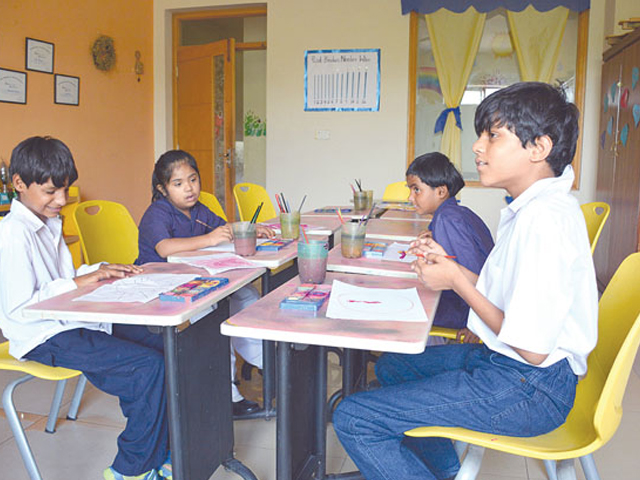
Why do we insist on treating children with special needs differently?
These children are not ‘handicapped’. They don’t need looks brimming with pity greeting them wherever they go.
Recently, my friends and I interned with the Child Development (CD) ward at The Children’s Hospital in Lahore. Many students opt for summer internships in order to aggrandise their resumes, gain experience for future jobs, or simply add lustre to their otherwise boring summer holidays.
We sauntered through the glass doors of the hospital, cracking jokes and addressing each other in husky voices with the title of ‘Dr’ tethered to our names. We were not, however, anticipating how this two-week experience would change our perspective.
The hospital itself was a surprise. The phrase ‘government hospital’ is often associated with decrepit, insanitary, and feculent buildings with incompetent staff and inadequate facilities. However, this was not the case, particularly at the CD ward. The CD ward consisted of several vibrant, classroom-like rooms, and catered to children with developmental delays.
There is a ‘Sensory Therapy Room’ – fitted with ingenious devices which produce mellifluous tunes, coruscating cinemagraphs on the walls, and strands of colour-changing threads – which serves to enhance the sensory input and output and hone the interaction and concentration of children with autism and similar disorders.
There is an Occupational Therapy room where various exercises for children with cerebral palsy are demonstrated as well. A team of experienced special needs instructors, speech therapists, psychologists and experts formulate and adhere to ‘plans’ and ‘eventual goals’ which are unique to each child.
Since it is a government hospital, parents from divergent vocations and classes can get their children treated for free. It was inexplicably bewildering, seeing all the children sit together in one room, exchanging crayons and chicken nuggets and laughs, so different and yet bonded together due to their disease. There is no medication for these children, no magical drug which will extricate them from the abyss of their disorder and leave them, Free Willy-like, on the shores of ‘normalcy’.
There is only education and hope.
How often did we, as students, groan at the prospect of preparing for an exam, doing some extra homework, or simply going to school?
Think of those who are not able to do any of this, whose ‘delays’ bar them from approaching the gates of majority of schools in Pakistan. I felt ungrateful, seeing how every fibre in their little minds kept trying and trying.
One of the children, a regular attendee, travels all the way from Balochistan. Imagine how difficult it is for his parents to interweave through provinces because Pakistan only has a few such hospitals catering to children with special needs. But they do it, because they have faith in their children, and so should we.
What intrigued me the most was how intelligent some of these children are. They grappled with new topics, struggled with the classwork and homework assigned to them, but teaching them alphabets and counting, along with Math, English and Urdu was truly a rewarding experience.
It got me thinking. What is it about these children that end up snatching the label of ‘normalcy’ from them? Weren’t these kids as smart, if not smarter, than normal children? Why is it that we always view a special needs child with pity and sympathy?
My eye caught a sign on the door, decorously festooned with butterflies and sparkling paint.
“We need empathy not sympathy.”
And it was true.
These children are not ‘handicapped’. They don’t need looks brimming with pity greeting them wherever they go. They need you to understand that they are normal children. They need you to treat them like you treat normal children. They need to be educated, and they need your help.
It is inexplicably difficult to procure one incident or a child which really struck a chord within me. There were so many amazing little people with countless charming little stories. However, it is true that a certain individual, scrupulously regular at the hospital, really made an impact on me.
When I first set eyes upon 21-year-old Fatimah*, I automatically assumed she was one of the older pupils of the class. She was diagnosed with Down syndrome, which gives one the impression that she is considerably younger than her actual age. I later discovered that she had come to the department as a student many years ago and was now a teaching assistant there.
Another child who left an impact on me was 12-year-old Saad* who is ‘mildly autistic’. Saad will be appearing for his Matriculation Exams in a few years’ time.
These amazing children and others are living proof of how capable ‘special’ people are of living their lives normally and happily, free from prejudice.
I was tempted, like a veritable Mary Poppins, to promise the kids I would visit them every summer, but I didn’t. I didn’t want them to anticipate something which might, for some reason, may not work out. But I hope they know, and I quote Nanny Diaries here,
“We’re rooting for you.”
So next time you come across a child with special needs, do not change your attitude towards them out of sympathy. Instead, give them the respect they deserve by treating them equally and normally.
*Names have been changed to protect identities.

COMMENTS (5)
Comments are moderated and generally will be posted if they are on-topic and not abusive.
For more information, please see our Comments FAQ